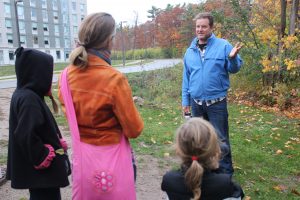BY TAYLOR CHARETTE
For students at Sheridan’s Trafalgar Campus the ability to take a walk in the forest is just steps from the classroom. However the forest surrounding the campus is not as healthy as it once was.
On Tuesday, Paul O’Hara, a field botanist, landscape designer and native plant gardening expert led a guided hike through the trails McCraney Woods adjacent to the campus.
Members of Oakvillegreen Conservation Association, Sheridan Earth Club and interested members of the community gathered for the walk. Even the grey skies and rainy weather didn’t dampen the group’s enthusiasm for the first of the two-part Trees & Bees Talks initiative.

O’Hara, an Oakville native, recalled playing in the woods as a child. Back then it was a lot healthier he said.
The group of about 15 came across the first sign of the forest’s sickly condition before they even entered – a wall of buckthorn, an invasive species from Eurasia. The noxious plant was spotted throughout the hike. At one point the group walked along a trail, under an archway of buckthorn, its bright green leaves a stark contrast to the fall colouring of the native plants.
“Trails are good and bad,” said O’Hara. “Good for getting people out but bad because they invite invasive species.” It may take native species hundreds or thousands of years to work with the invasive species.
O’Hara made it clear that efforts could be made to improve the health of the forest. “Sheridan should be stewards of the land… they have enough bodies,” he said. An effort to remove invasive species could be organized. However as of right now it seems that there is no such effort being organized. Nick Crawford and Yi Xiang, co-presidents of Sheridan Earth Club are excited about the second part of this initiative. They are eager for students to take part.
Victoria MacPhail, a PhD candidate at York University will visit Trafalgar Campus Nov. 24 in C208 to discuss the decline of the bee, using data collected by citizen science.
